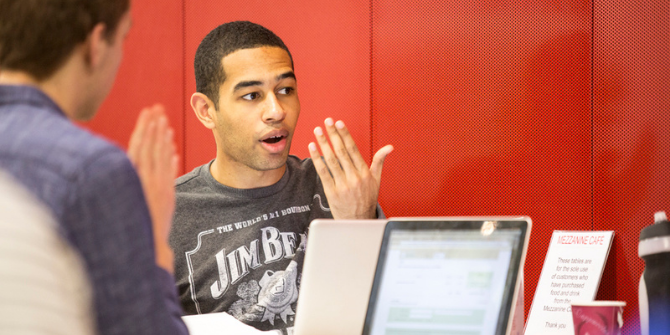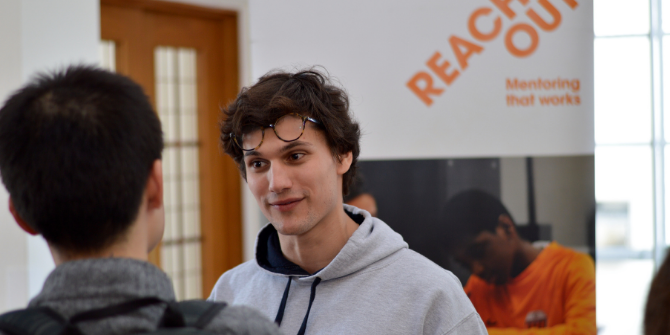Guest blog by alumnus Lee Bailey, MSc Development Studies 2012-2013 and Director of Communications at the Natural Resource Governance Institute.
I recently had the pleasure of returning to LSE to speak with a number of students about their interests in the international development space, as well as communications work. As the director of communications at a policy institute/NGO, I felt I had some useful advice and tips to share. With the hope of benefiting more students, I’m sharing the same ideas here, in blog form.
Getting experience
Far and away the most common question younger LSE postgrad students seem to ask concerns the old chicken-or-egg conundrum of needing experience to land that first position in your desired field. Even entry-level jobs seem to require some relevant experience – so how do you get the experience, without having already had the entry-level job? The most common answer to this question is “get an internship“, which is valid advice. But beyond that, how can a student showcase his or her experience and/or familiarity with a topic such as international development?
Social media
Luckily, the internet has evolved to help. Twitter is an excellent way to follow and engage with “communities of practice” – and even to make something of a name for yourself among targeted employers. I recommend that students establish Twitter handles that they can use to follow the prominent individuals and organisations in a given field. After the student has learned the basics of Twitter and observed how people in the sector use it, he or she can start engaging through retweeting and posting original thoughts and informed comments. You can use the “about me” section of the Twitter registration to shape a profile that gives people the right impression – here is where you assert your interests and specialities. Don’t exaggerate or overclaim – just be honest. “LSE postgrad working on gender and humanitarian issues” is a credible, strong statement for example (better for professional purposes than “Man U supporter and Candy Crush addict.“) I recommend that students who already use Twitter for social purposes consider establishing a separate handle for their professional/academic pursuits. Maintaining a Twitter feed that is suitable for both social and professional audiences is possible, but it can be tricky.
Having a visible track record on Twitter can demonstrate to an employer that you have a history of thinking about and engaging in issues relevant to the sector. All the better if the feed links to interesting content – especially if it’s your own. This is where a personal website or blog can come in handy. A blog can function as a repository for content you’ve generated, even if it’s relatively low-profile. You can post student essays and papers, and link to anything you might have published in an LSE journal, newsletter, or blog. LinkedIn is also a great place to share this content. Employers will understand that you may not have a long track record professionally, but will appreciate that even as a student you’ve engaged in the issues and promoted your own ideas. The idea is to convey that you’re a budding specialist, rather than new to it all.
Networking
Another piece of advice I share is “attend events“. LSE’s London location means that those interested in international development and affairs have an active calendar of events on which to draw. Yes, we all know “networking” is important, but most LSE students don’t tap the pool of institutions in London from which to build a network. Put yourself on the mailing lists of NGOs and think tanks like ODI, Global Witness, Chatham House, and others; not to mention the relevant departments of institutions like LSE, SOAS, University College London (UCL), King’s College London, and Oxford University. At events, ask questions in Q&As, and don’t be afraid to approach experts after panel discussions. Tell them who you are, what your interests are, what interest you about them, and ask for their business cards. If your interest is in communications work, find the staff who are organizing the event, compliment them on it, and learn more about how their communications operations function.
Your CV
When it comes to actually applying for positions, the best piece of advice I got (from Shaun Harris of LSE Careers) was to be sure to include the “profile” segment at the top of my CV. Akin to the self-positioning on Twitter I mentioned before, this is a free-form space for you to promote yourself in exactly the way you want to be seen. As an employer myself, the first thing I look at is an applicant’s CV, and the top of the first page is of course what I see first. If he or she persuades me there to keep reading, then that is a major gain. Again, be truthful, but assertive. “LSE postgraduate candidate, with working knowledge of aid transparency initiatives and demonstrable research and communications skills” is much stronger than “LSE student seeking position in international development.” You should tailor these statements to the job or organisation for which you’re applying. Also, if you can share in your CV any quantifiable results – whether in your desired field or another one – that is very impressive to employers. Whether they pertain to your research, your track record increasing social media followings, or hits on your blog, numbers sometimes speak louder than words.
Hopefully these tips will help with the search. Good luck!





